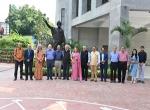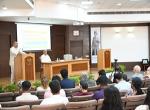The Vivekananda International Foundation (VIF) on 02 Aug 2017 organised a discussion on a recently published book on India’s foreign policy, ‘From Chanakya to Modi: The Evolution of India’s Foreign Policy’, authored by Dr. Aparna Pandey, the Director of the Future of India and South Asia Initiative at the Hudson Institute, Washington DC. Two of India’s former Foreign Secretaries – Amb Lalit Mansingh (1999-2000) and Amb Kanwal Sibal (2002-2003), led discussions, with Dr. Aparna Pandey, author, being present on the panel. Lt Gen Ravi Sawhney, former Deputy Chief of the Army Staff and Dean of the Centre for Defence Studies, VIF, chaired the session, while Amb Rajiv Sikri, Amb R Rajagopalan, Amb Ashok Sajjanhar and Amb Yogendra Kumar, among other foreign policy and security experts, participated in the discussion.

While introducing the book, General Sawhney opined that Prime Minister Modi’s numerous foreign summits across continents have not only considerably enhanced India’s image abroad but also raised tremendous interest in India. He, however, regretted the existent gap in literature on India’s foreign policy. Taking on critics who criticize India for not having a coherent and well-articulated foreign policy, General Sawhney underlined that India’s foreign policy cannot be understood in western concepts. He further added that Dr. Aparna’s book not only fills an avoidable gap in literature on India’s foreign policy, but also carves out the essential underpinnings of India’s foreign policy, linkages which travel far back in history to her civilizational and cultural moorings.

Chipping in with her own views, the author Dr. Aparna Pandey explained that India’s foreign policy has been a continuum from its history, shaped by the national experiences and the country’s view of itself, as also by leaders who have held premium positions for longer durations. While adding foreign policy does not exist in a cultural vacuum, the author continued that in the case of India, the foreign policy paradigm is as deeply informed by its civilizational heritage as it is by modern ideas about national interest. Even policies that appear to be new contain echoes of themes that recur in history. She took time to explain various other facets of India’s foreign policy, including the roles of individuals and institutions in the framing of India’s foreign policies. An astute observer of India’s foreign policy, Dr. Aparna commented that India’s foreign policy under Prime Minister Mr. Narendra Modi is poised for a paradigm shift while the ‘Modi Doctrine’ is still evolving. She pointed out key drivers to India’s foreign policy under Prime Minister Mr. Narendra Modi – a focused approach, his worldviews and an in-depth understanding of national self-consciousness, civilizational values and cultural ethos, among others.

Dr. Aparna’s book was later subjected to a closer scrutiny by the two ex-Foreign Secretaries on the panel. Amb Lalit Mansingh set the ball rolling for a lively discussion with his observation that the book is too short to do justice to the title. Even as the two former Foreign Secretaries challenged some of the hypothesis contained in the book while critiquing these solely on merits, they recommended the book as must-read for all practitioners of India’s diplomacy. The discussion, however, broadly encapsulated the range of diverse interests and influences which shaped up India’s foreign policy - past and present. Of immediate interest, the discussion delved into reasons for India adopting Non-Alignment which remained the cardinal principle of India’s foreign policy for a better part of independent India’s history – compulsions and consequences, the Indira Doctrine (if ever there was one), the debate around idealism and pragmatism, and India’s quest for strategic autonomy as corollary to its economic development, among other issues. The audience, comprising a few of India’s leading policy experts, gave further substance to the discussion during the Q&A session.






